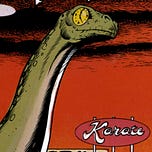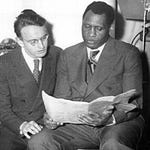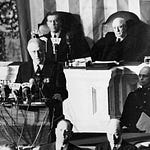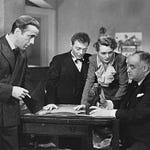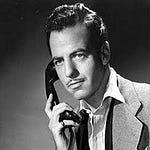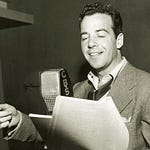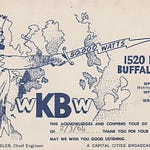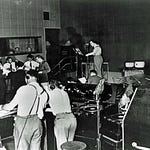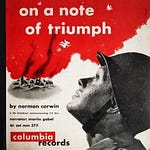Firesign officially hits the streets this Tuesday, October 29. Many, many thanks to all who have pre-ordered. I look forward to hearing what you think.
Sharing something a little different today: an excerpt from the Firesign Theatre’s Dear Friends radio show, which broadcast on KPFK from September 1970 to February 1971, between the release of Don’t Crush That Dwarf and the recording of I Think We’re All Bozos on this Bus. This segment appeared on the September 16 broadcast.
When I started working on my book, I was surprised to discover that most of the scholarly writing on the Firesign Theatre (such as it was) had to do with their radio programs.1 And as I made contact with the fans, I realized that many of them — especially the ones based in LA — were equally, if not more, devoted to the radio shows than to the albums.
That’s not true for me. (As John Lennon said to Keith Richards, “I’m a records man, me.”) The radio shows were an important source for my book, but I usually use them as I’m discussing the albums that grew out of the freewheeling improvisations on the radio: at one point Firesign is talking about a recent spate of airplane hijackings, and then start speculating about whether someone could hijack a school — on Don’t Crush That Dwarf, that idea reappeared in Communist Martyrs High School’s disassembly of their rival Morse Science High storing it in their basement “taken apart, stacked up, and labeled!”
But in the radio shows you definitely can hear how they riffed and improvised together in real time, and there are many moments of incredible and invention, if you have the energy to give yourself over to them.
The one I’m excerpting here is one of my favorites, and it is so amazing that I’m surprised it wasn’t excerpted on either of the compilation albums (linked below) drawn from the shows. It gives a great sense of how they worked. Someone, probably David Ossman, has evidently found a story, told as a series of letters (an epistolary), evidently published in an early 1960s magazine for older Jewish people. The widower “Abe Gold” is retiring from Brooklyn to Florida, and is writing to request a transfer of his membership in the Golden Ring Club. The secretary of the Miami Beach branch, “Anna Gold,” writes him back. Over the exchange of a few letters, they have an improbably brief (but hilarious) courtship, and by the end have agreed to marry.
The Firesigns take turns reading the letters in character, while their engineer, the Live Earl Jive, drops in sanctimonious church organ music in the background. It starts relatively straight; the only gag is the high melodrama given the performances and the fact that the four Firesigns are taking turns reading what should actually be divided between two actors. Eventually, they start speaking in stagey Jewish accents, though not consistently.
After about two and a half minutes it starts to go off the rails, though, cued by the Live Earl Jive dropping a new record that sounds like a clip from the Beatles’ “Revolution 9.” The organ then returns in a highly dramatic finale, as Phil Austin reads Anna’s breathless line, “Yes, I would love to meet you at the train! I do hope you get a good price for you business. You shouldn’t have to take a loss on it.” The organ record now dispatched, the Jiver drops in ringing school bells, a snatch of Spanish guitar, and then an ostentatious series of church bells (anticipating the wedding), under which he mixes some noodling Hawaiian guitar (suggesting that he had two turntables in the booth).
Incited — or maybe thrown off — by these shifting sonic environments, Phil Proctor begins Anna Gold’s last letter in a male voice and then shifts mid sentence to a female voice. As her final letter (her resignation from the Sunshine Committee of the Golden Club) brings the story to its climax, all four Firesigns are now trading lines, and end the letter in unison: “P.P.S. Mr. Gold is moving into my bedroom apartment, that is, as soon as we are married so please notify the Good and Welfare Committee that I have an efficiency available!” And as they fade out, the Jiver plays “Duke of Earl” and Austin shouts, “Nixon’s Water Music, baby, Duke of Earl, baby!”
Taken as a whole, the segment shows how the group would come to the radio shows with found material that they would perform — and deform — together in real time, giving and taking cues as they went, with the crucial contributions of their fifth collaborator, Earl Jive (Vaughn Filkins). As one of their mentors, KPFK’s music director Bill Malloch put it, “You can always improvise if you’re thoroughly prepared, but their preparation was a matter of ongoing temperament.”2
I pulled this piece from the astounding 80-hour compilation Duke of Madness Motors, an 80-hour compendium of their KPPC and KPFK radio programs, put together by Taylor Jessen released on Negativland’s Seeland Records in 2010. It includes a book of essays, photos, and interviews. It is superlatively done, and I recommend it highly. Anyone interested in a (much) more user friendly introduction to Firesign’s radio work can start with the Dear Friends 2xLP set released by Columbia in 1972, or with Taylor’s recent sequel, Dope Humor of the Seventies (also available on vinyl). Both of these are also available on streaming services like Qobuz. There are legal disputes that have currently pulled down much of Firesign’s Columbia material off Spotify, but Dope Humor and a few of the mid-70s records are available there now.
If you know these shows or these records, hit me up in the comments with your experiences and your favorites. I know they were syndicated, and WFMU has continued to play them from time to time. Let me know where you found them!
A good short discussion of Radio Free Oz is in Jesse Walker, Rebels on the Air: An Alternative History of Radio in America (New York: New York University Press, 2021).
William Malloch, interview by Chris Palladino, 1 June 1995. Firesign Theatre Collection, National Audio-Visual Conservation Center, Library of Congress.

